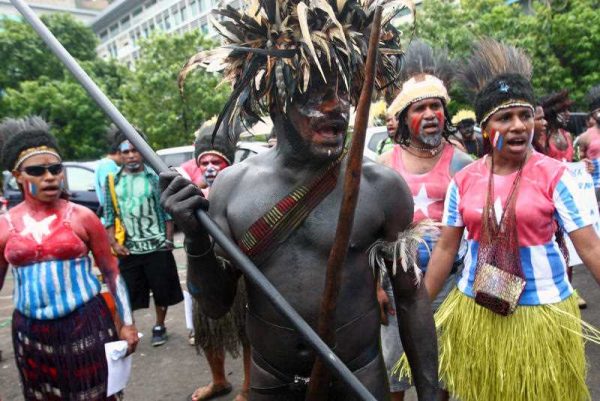A critical juncture came after the downfall of the authoritarian regime of former general Suharto. Beginning in 2002, President Megawati Sukarnoputri’s administration implemented the Papuan Provinces Special Autonomy Law, which aimed to give Papuans more authority to manage their affairs based on local customs. For many elites in Jakarta, a special autonomy law was the key to resolving all Papuan problems, including creating a sense of being Indonesian and protecting against human rights abuses. But these objectives failed to be achieved because the Indonesian government has never thoroughly identified, or admitted to, the basic problems regarding Papua: namely, its historical and political status.
Distrust towards Jakarta among indigenous Papuans dating from the controversial 1969 referendum fortifies ethno-nationalist aspirations to secede from Indonesia. In order to tame these sentiments, the security apparatus has taken a repressive approach towards indigenous Papuan dissent. But repressive actions by police and military forces have instead strengthened Papuans’ separatist aspirations.
The challenges that many Papuans have faced in expressing their political, economic, social and cultural rights have drawn close attention from the international community, including in recent times from a group of Melanesian countries united under the Melanesian Spearhead Group (MSG) initiative. In 2015 the MSG granted observer status to the United Liberation Movement for West Papua (ULWP), an amalgamation of organisations campaigning for Papuan independence from Indonesia.
This has compounded concerns among Jakarta-based elites. The real question is why the Indonesian government seems to have been unable to defuse the internationalisation of the Papuan issue, particularly at the regional level.
Several reasons lie behind the ineffectiveness of Indonesian foreign policy in handling the Papuan independence issue in the Pacific. Generally, a lack of coordination between the Ministry of Foreign Affairs and other parts of government has led to the lack of a single policy to defuse the independence push.
There is a need to align what happens on the ground with what is presented to the international community. Papuans’ political and cultural aspirations are met with heavy-handed treatment by the Indonesian security apparatus. But the Ministry of Foreign Affairs has denied this. Rather, it has repeatedly stated at international forums that conditions, particularly indigenous rights, have improved significantly despite human rights reports showing otherwise.
Another instance of rhetoric not matching reality is the fact that although Indonesian President Joko Widodo promised that there would be no restrictions on foreign journalists’ travelling to Papua, there have been no specific policies to implement such a promise. Any foreign journalist who wants to visit Papua still has to obtain permission through complicated procedures and follow strict requirements, particularly from security agencies, and occasionally without coordination with the Ministry of Foreign Affairs.
For years the Pacific has not been a diplomatic priority for the Indonesian government. There is no single agency within the foreign affairs bureaucracy that mainly focuses on Pacific countries. As a result, many Indonesian diplomats lack the competence to respond to the Papuan independence campaign currently gaining traction across the Pacific region. Indonesia lacks strong diplomatic relationships with Pacific states, even though formal diplomatic relations with countries such as Papua New Guinea and Fiji were established in the 1980s.
Indonesia has provided only ad hoc economic assistance to Pacific countries, either as part of economic diplomacy or to attempt to limit the sway of Papuan independence campaigners. The Indonesian president’s recent rejection of a request for a meeting from the Solomon Islands prime minister and chair of the MSG, Manasseh Sogavare, raises doubts about Indonesia’s commitment to tackling the pro-independence narrative through diplomacy.
In any case, the Indonesian government has not learned from its past actions related to separatist movements. In the case of East Timor, the Indonesian government underestimated the role of the Fretilin group and its charismatic and savvy chief diplomat, Jose Ramos Horta. Despite limited resources, Horta was able to convince the international community to pay close attention to what happened in this tiny nation from its integration in 1975 to its attaining independence in 2002. In the case of Papua, the central government has underestimated the potency of Papuan intellectuals, both in Papua and in exile, to coordinate their campaign for independence.
Ineffective diplomacy in the Pacific and elsewhere is hampering Indonesia’s ability to counter the internationalisation of pro-independence narratives — and with that its ability to promote solutions to the Papuan conflict that emphasise dialogue between the Indonesian government and its Melanesian citizens.
Hipolitus Yolisandry Ringgi Wangge is a researcher at the Marthinus Academy in Jakarta. Gafur Djali is Executive Director of the Maluku Institute. Both authors have been conducting fieldwork research in Papua.


How can modern-day Indonesia, a country so deeply harmed itself by Dutch Colonialization in the past, and a country whose own founding Constitution strictly prohibits colonization and subjugation of any indigenous population continue to colonize the native peoples of West Papua ? This article says that the 1969 Act of Free Choice was deeply flawed. Indeed it was. The Indonesian army sought to manipulate the election outcome through, fear, terror and intimidation of any secessionist view held within Papua. Instead of allowing all Papuans to vote, Indonesia carefully selected some 1000 Papuan voices to vote for integration, the only result acceptable to Suharto. Suharto’s stance meant that the “so called” Act of Free Choice could never have been fair or transparent – which it certainly was not. Since that time, over 500,000 Papuans have lost their lives ( some 500 times more than the number coerced into voting ) have been killed pursuing Independence for their homeland. And still the killing goes on in West Papua. When will Indonesia give-up on colonialism and let West Papua go free.